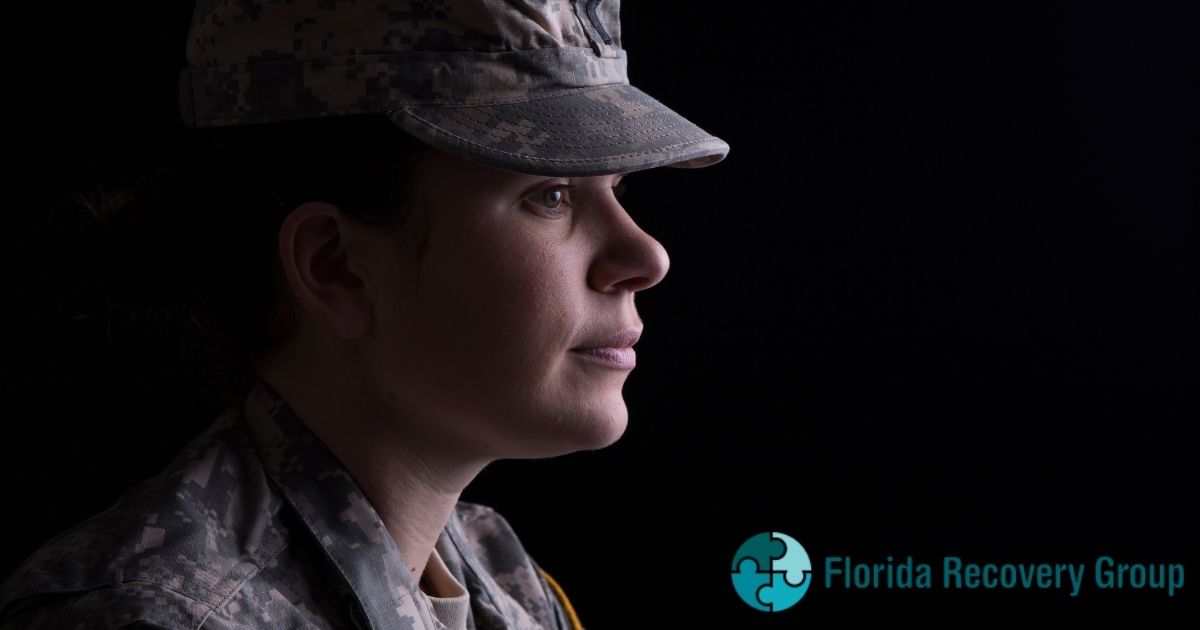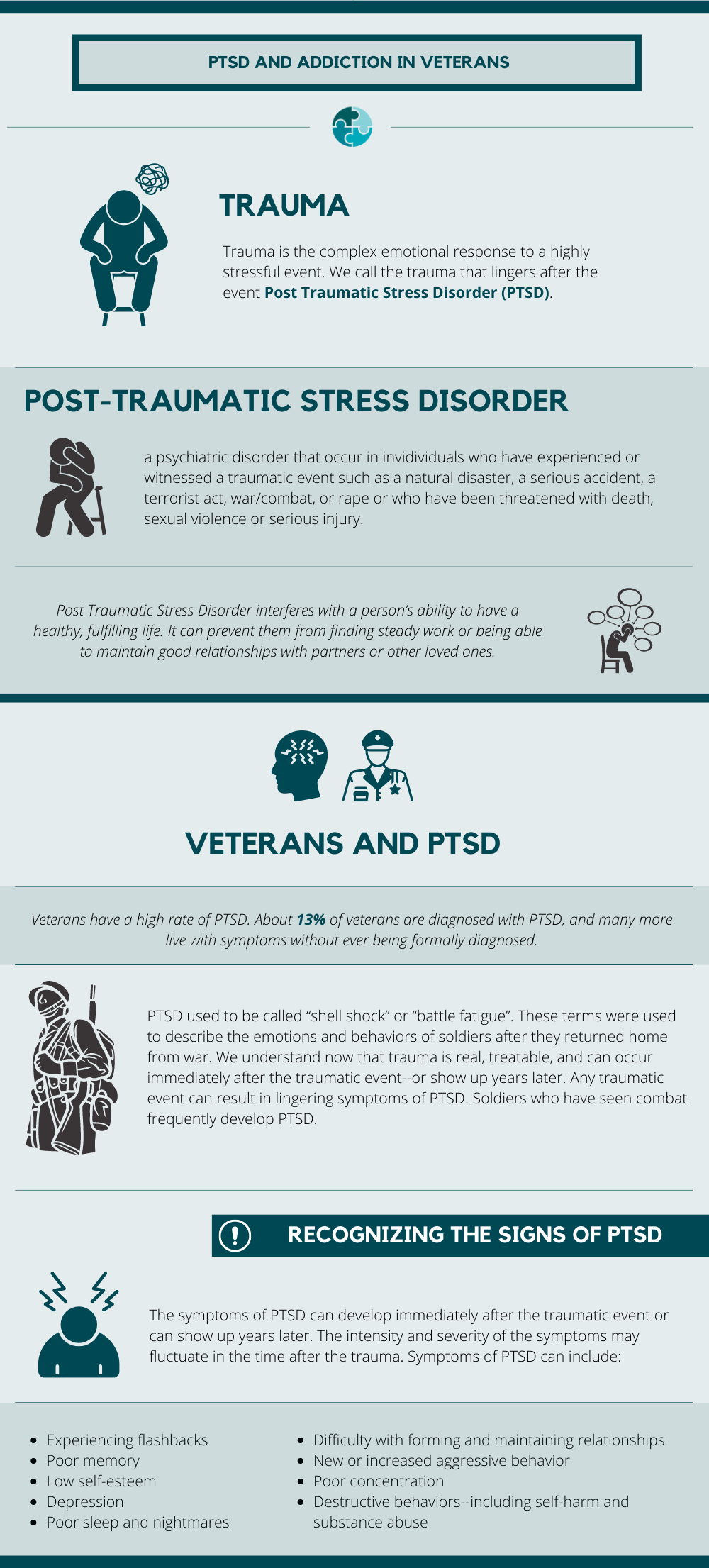
25 May PTSD and Addiction in Veterans: Symptoms and Treatment
Addiction impacts the lives of millions of Americans. When someone is addicted to drugs or alcohol, their addiction affects every aspect of their life, including their physical and mental health and the community around them. Addiction does not just appear out of nowhere. It usually arises from some combination of biological and environmental factors. One common factor in addiction is trauma.
Trauma is the complex emotional response to a highly stressful event. We call the trauma that lingers after the event Post Traumatic Stress Disorder (PTSD). Veterans have a high rate of PTSD. About 13% of veterans are diagnosed with PTSD, and many more live with symptoms without ever being formally diagnosed. Without proper treatment, many people rely on medications, drugs, or alcohol, making PTSD and addiction a common diagnosis among veterans.[1]
Substance abuse treatment is important for any person who struggles with addiction, but the right kind of treatment is crucial for veterans living with PTSD. It is not enough to simply put veterans into a one-size-fits-all program. Instead, they must be given trauma-informed substance abuse treatment that can treat the symptoms of their PTSD alongside their addiction.

Understanding PTSD and Addiction in Veterans
A lot of research has been done on Post Traumatic Stress Disorder to develop effective treatment programs for it. We know that people who have untreated PTSD also go on to develop substance use disorders at a rate that is higher than the general population.
PTSD used to be called “shell shock” or “battle fatigue”. These terms were used to describe the emotions and behaviors of soldiers after they returned home from war. We understand now that trauma is real, treatable, and can occur immediately after the traumatic event–or show up years later. Any traumatic event can result in lingering symptoms of PTSD. Soldiers who have seen combat frequently develop PTSD. Even soldiers who are not actively involved in combat can still have trauma from prolonged periods of tension, fear, or anxiety. They may develop trauma from a prolonged period away from home. Some soldiers report symptoms of PTSD after a sexual assault–and 23% of female soldiers report at least one incident of sexual violence during their time in the military.[2]
Post Traumatic Stress Disorder interferes with a person’s ability to have a healthy, fulfilling life. It can prevent them from finding steady work or being able to maintain good relationships with partners or other loved ones. Left untreated, PTSD can also lead to substance abuse. There is a strong correlation between veterans with PTSD and drug or alcohol addiction.
Recognizing PTSD
The symptoms of PTSD can develop immediately after the traumatic event or can show up years later. The intensity and severity of the symptoms may fluctuate in the time after the trauma. Symptoms of PTSD can include:
- Experiencing flashbacks–emotionally re-living the trauma as though it is happening in real life
- Poor memory
- Low self-esteem
- Feelings of hopelessness and/or depression
- Poor sleep and nightmares
- Difficulty with forming and maintaining relationships
- New or increased aggressive behavior
- Poor concentration
- Destructive behaviors–including self-harm and substance abuse
When trauma is untreated, many people attempt to numb the pain or intensity of their emotions. For many people with trauma, this includes using drugs or alcohol. Without treatment for their PTSD, many veterans come to rely on substances to help them cope with the trauma. Unfortunately, this often leads to addiction that requires treatment.
Treatment for Veterans With PTSD and Addiction
Some veterans receive prescription medications like Ativan or Xanax to help them manage their anxiety, and many of these medications can lead to dependence. They may also receive prescriptions for pain relievers such as Oxycontin or Vicodin to help them manage pain after an injury. Many of these prescription pain relievers are highly addictive. Or, they may develop a dependence on drugs used to help them sleep, like Lunesta or Ambien. Many veterans are at risk of developing an addiction to recreational drugs or alcohol that they may use to dull the symptoms of untreated PTSD.
To have the best chance of recovery, someone who is struggling with addiction to any substance must receive substance abuse treatment. Some of the symptoms of addiction include:
- Spending a lot of time getting, using, or recovering from using the substance
- Financial problems
- Using more of the substance than planned
- Using the substance despite negative consequences
- Having withdrawal symptoms when attempting to cut back or stop using the substance
Treatment for veterans with PTSD must include both addiction treatment and compassionate, knowledgeable care for their trauma symptoms, too. Treatment for addiction usually involves three phases.
Detox
People receive medical observation and treatment for uncomfortable or dangerous withdrawal symptoms. They have a chance to experience complete detox because they are supervised during the stage where their cravings are likely to be very intense.
Treatment
During a treatment program, people receive education, medical treatment, and therapy–including individual, group, and family sessions–that help them learn how to live life without substances. In the treatment of PTSD and addiction in veterans, a trauma approach is used.
Aftercare
Addiction is a lifelong condition that must be managed. People must have a plan to receive ongoing care and support to help them avoid relapse. Aftercare can involve continuing therapy and being actively engaged in recovery groups, as well as any receiving necessary medical care.
Find Treatment For Veterans Struggling With PTSD and Addiction
If you or someone you love require sensitive, trauma-informed addiction treatment, please reach out to the staff at the Florida Recovery Group. We offer a range of addiction treatment programs for veterans living with PTSD.
We believe that veterans have sacrificed a lot for their country and deserve effective, compassionate care. The goal of our military program is to help veterans live the healthy, fulfilling lives they deserve. If you are ready for life-changing treatment, call today to get started.
References:





